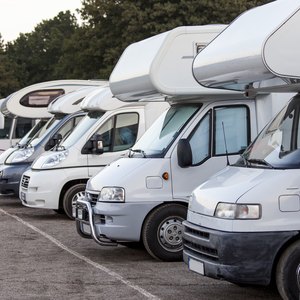
The call of the wild and the freedom of the open roads may sound exciting, but you won't know if RVing is right for you until you actually try it out. Before you invest several thousand dollars in a recreational vehicle for the first time, answer these questions to determine how you plan on using your RV.
How Will You Use It?
These questions will help determine how much living space you need, what type of floor plan you'll want for your lifestyle and give you some guidance as to which is the right RV - and options - you should buy.
Where will you use it? Are you thinking about buying an RV to take an occasional vacation to visit national parks maybe once or twice a year? Or are you considering going full-time RV and living in your motorhome year-round?
How many people and pets will be going with you? What sleeping capacity will you need? What size and features will you want to accommodate your lifestyle as RV owners?
When will you be taking your trips? Will you be traveling in the summer and need air conditioning or taking winter trips and need heating? Some RVs come with air conditioning and heating systems, but others do not.
Will your RV be motorized or towable? Motorhomes are larger and offer more comforts, but towable RVs are more flexible and easier to drive.
How much are you willing to spend? You can buy a used pop-up trailer for just a few thousand dollars, but a fully-equipped motorhome can cost upwards of several hundred thousand dollars.
Read More: Can You Claim a Travel Trailer on Taxes?
What Are the Different Types of RVs?
There are several different types of RVs ranging from large motorhomes that can cost thousands of dollars to smaller travel trailers and pop-up campers you can buy used for just a few hundred dollars – and that you can probably tow with your family SUV.
RVs come in two types: motorized and towable. Here are the most popular styles.
Class A: Class A RVs are motorhomes that have everything you would normally have in a full-size house. They are the largest drivable RVs and do not require a separate tow vehicle. Class As will usually include kitchens, bathrooms, living areas large enough for entertaining plus one to four slide-outs. They usually have central heating and air conditioning. You can tow another vehicle with a Class A motorhome.
Class B: Camper vans are classified as Class B RVs. They are smaller, more compact and easier to drive than a Class A RV. They are more suitable for a solo traveler or a couple, not for families. Camper vans usually come with a kitchen, a shower with a toilet and an entertainment system.
Class C: Class C RVs are designed to be installed on a truck or van. The sleeping compartment is positioned over the driver's cab. Class C motorhomes have most of the facilities of a Class A motorhome but are smaller and cost considerably less. Even better, Class C vehicles get higher gas mileage, ranging from eight to 10 miles per gallon.
Pop-up campers: Pop-up campers have canvas walls that collapse into a smaller, towable package. They're lighter and easier to tow and maneuver with an SUV or light truck. Although space is limited, they do come with kitchen areas and sleeping facilities. However, they don't always come with showers or toilets, and they do not come with air conditioning or heat.
Fifth wheel: Fifth wheels are large trailers that require fifth wheel hitches to tow them. The hitch is installed in the bed of your pickup truck. Fifth-wheel trailers are almost as large as a Class A motorhome with most of the same luxury options and require at least a one-ton truck to tow them. As an added attraction, most fifth-wheel trailers also come with several slide-outs that expand the living area once you have arrived at your camping site. You can also unhitch your fifth-wheel trailer once you have arrived at your destination and use the pickup truck for driving around locally. You don't have to tow a separate vehicle as you would if you were driving a Class A motorhome.
Travel trailer: Travel trailers are the most popular and economical way to get into the RV lifestyle. They’re lightweight and can likely be towed with your family SUV or a light pickup using a conventional ball hitch. This means you can unhitch your trailer at your destination and use your vehicle to explore the surroundings. Travel trailers have solid walls and come with a variety of kitchens, bathrooms, toilets, entertainment systems and slide-outs to give you more living space.
Read More: How to Financially Plan for a Vacation
Set a Budget and Arrange Financing
Even the least expensive RV can come with a substantial price tag. In addition, RVs require maintenance and the gas expense can be considerable on those long road trips since these vehicles do not get the best mileage, usually four to six miles per gallon.
Although you might be able to get financing through a dealership for a new RV, financing for used RVs can be more difficult. You'll probably have to go through your personal bank relationship to get a loan for a used RV, especially if you are buying from a private party.
A good way to find out how much the RV you want is going to cost is to rent several different types of RVs before you invest thousands of dollars. Try out several floor plans and different options to find the ones that will work best for your family RVing adventures. The expensive models have more floor space and options, but you may find that you don't need all these accessories and will be happy with less expensive models.
How much can you afford in monthly RV payments? Make sure your total debt service of all of your personal loans does not exceed 40 percent of your monthly gross income. This guideline may restrict the amount you can spend on an RV.
Read More: How to Have an Affordable Disney Vacation
Buying a Used RV From a Private Party vs. a New RV from an RV Dealership
It's no secret that a new RV suffers a huge depreciation the minute it leaves the RV dealer's lot. However, buying from a dealership means that you can probably get more of the options you want, benefit from a manufacturer’s warranty and have the dealer arrange financing.
Buying a used RV means you will have to do more searching, like going through listings on RV Trader or Craigslist, to find an RV with the options you want. In addition, you have to be very careful about the condition of the vehicle, the number of miles driven and any maintenance required, especially water damage or any repairs needed for major mechanical items. Also, when you buy a used RV, you have to arrange your own financing or be prepared to pay cash.
References
Writer Bio
James Woodruff has been a management consultant to more than 1,000 small businesses. As a senior management consultant and owner, he used his technical expertise to conduct an analysis of a company's operational, financial and business management issues. James has been writing business and finance related topics for work.chron, bizfluent.com, smallbusiness.chron.com and e-commerce websites since 2007. He graduated from Georgia Tech with a Bachelor of Mechanical Engineering and received an MBA from Columbia University.

